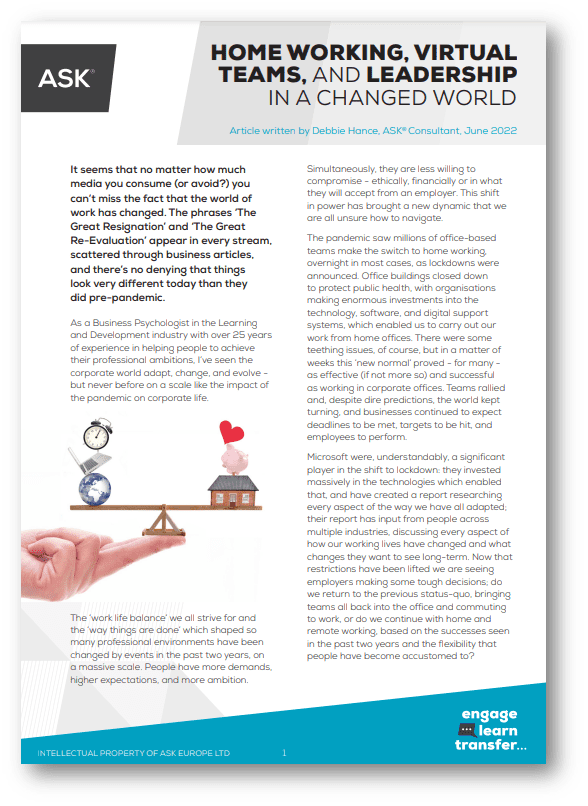Are your leaders letting your people down?
What to look out for...
Leadership isn’t always easy, and it can be hard to balance your own needs with what’s best for every member of your team. What happens when you clash with someone who works for you? How do you cope when your organisation is led by a bully? Let’s explore five problems identified by organisations we’ve worked with in the past – and how we helped them to overcome these widely recognised problem leaders!
1: Helicopter leadership
A helicopter leader is that person who is always hovering over your shoulder, nit-picking over every tiny detail, interfering in every person’s work, not letting anyone take the initiative or make any suggestions regarding how things are done – and not letting anyone get on with a task until they’ve had their say.
Micromanaging speaks volumes about a leader’s capabilities – and confidence in not only their team, but in themselves. A strong leader doesn’t need to hover, and someone who trusts their employees doesn’t need to keep an eye on every moment of their work.
Confident, capable leaders know that they’ve recruited and trained a team who can fulfil any task asked of them without pressure – and can delegate tasks safe in the knowledge that they will be carried out effectively and successfully, leaving you free to focus on the next steps for your organisation and how to continue to grow and succeed.
When we meet helicopter leaders we create a development programme which helps them to understand their own strengths, how they can build a team who fill the gaps in their experience, and build a cohesive, supportive network of knowledge and skills which bring the best from everyone, allowing that leader to thrive in their own role.
2: “But this is the way it’s always been done…”
We get it; change can be frightening – and one of the worries some leaders might have is that change in their organisation might highlight the areas they have less knowledge, or see them having to let go of the reigns to some extent, letting others step up to head new processes or methodologies.
Great leaders aren’t afraid of change – they embrace it, grow with it, and understand the importance of trying new ideas and techniques to see their organisation expand.
The only reason to stick rigidly to the status quo, and blinker yourself to change, is fear. Fear is contagious – and can spread throughout the workforce until everyone becomes nervy and stagnant – and that interrupts growth. No business can stay in one place – the world is changing every day, and the only way to maintain any kind of long term success is to recognise that, and move with those changes.
Something which has worked before – even when it has worked for decades – is always worth revisiting, and it might just mean that a small change can open you up to a whole new market, or lead you to discovering a new technology that simplifies a task, freeing up members of your team to work on other projects.
3: “I’m right, you’re wrong.”
This problem seems self-explanatory – any leader who refuses to take advice, or forces their point of view on their employees is, to put it bluntly, a bully. And bullies don’t make for a happy team.
Creating a culture of control and unhappiness means high staff turnover – people won’t want to stay in a place that stresses them out and makes them nervous to head into the office.
If you dominate your employees, they aren’t going to perform well; instead they’ll question every move they make, doubting their abilities and decisions, and they’ll hold back in fear of rocking the boat and getting another public dressing down.
We’ve met bullies in our time – and have helped them to find new approaches to having difficult conversations, taking space to consider their approach, and creating a culture that is more supportive, inclusive and encouraging – allowing people to come out of their shell and explore their own growth, and nurturing talent to enable individual growth within the organisation – meaning people want to stick around, and actively enjoy their work – which makes them work harder, achieve more, and benefits the organisation as a whole.
4: “Do it or else!”
What do you think people respond better to – the threat of punishment, or the promise of reward?
It’s important to set targets and goals for your workers – and to aim to grow and achieve more as a team. It’s also important to do this in the right way – and, in our experience, we find that setting achievable targets and rewarding success is far more effective than having the threat of failure hanging over people’s heads.
If your approach to leadership is “reach your targets or you’re out of a job” many people are so afraid that it freezes them – the threat is so significant that it causes anxiety, which gets in the way of creativity, performance and success.
If, however, there is a reward for reaching a target – and we don’t even necessarily mean a bonus or financial reward, it could be as simple as ringing the office bell or one-on-one praise from the boss – people will respond to the positivity. Praise and admiration can go a long way – considerably further than fear can take you.
It’s worth keeping in mind that setting one goal and setting the whole team at it can also be detrimental; if everyone is competing for one single reward, it can create tension and bad feeling. If, however, your team are all working towards their own individual goals, with your encouragement and support, you’ll see them all working at their peak, and growing in the pride they take in their achievements.
We have significant experience in coaching – working alongside leaders and managers to develop their own skills, and how to develop the best in their team, recognising strengths and areas that can be developed in each individual, meaning everyone has their own personal goals, which benefit the entire organisation.
5: “I can’t hear you…”
We have all experienced a situation where we’ve had a great idea, one we really think will help our project, or organisation. There are fewer things more frustrating than not even having the chance to voice that idea to our boss, let alone try it out and see whether it works.
And leaders who won’t listen to anyone else are shooting themselves in the foot – and quite probably missing out on some fantastic new ideas and fresh approaches which could revolutionise how things are done, bring huge successes to the business, or just simplify a process.
Not every suggestion you’re given has to be implemented, some of them might be dreadful – but if you refuse to even listen, how will you ever know?
Giving your workforce the chance to speak up, to be heard, from the uppermost tier of senior managers right down to the part time staff and interns, helps everyone to feel like part of the team – like they are all important and integral to the success of the day-to-day running of your brand. The more connected and involved your team feel, the more committed they will be to you in return – and the more established they will be in their position, meaning they will thrive – and you will benefit.
If you want to know more about how to build the kind of working environment that supports happy, thriving workers, and how to be the kind of leader who heads up this kind of culture, download our guide or get in touch today to arrange a meeting, and let’s work together to develop a programme which helps you to be your best.



